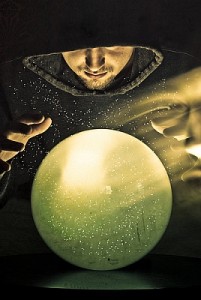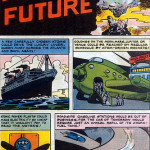 It’s always been of interest to me that the role of the ‘futurist’ has tended to exist outside of the cultural norms – a kind of half-visionary, half-mad form of thinking that has the air of professionalism co-exist in constant tension with an underlying suspicion of snake-oil salesmanship.
It’s always been of interest to me that the role of the ‘futurist’ has tended to exist outside of the cultural norms – a kind of half-visionary, half-mad form of thinking that has the air of professionalism co-exist in constant tension with an underlying suspicion of snake-oil salesmanship.
The role of the futurist is akin, in some small way at least, to a modern shaman – playing with the boundaries of society and bringing insight through observation, public conversation and an obsession with the experimental frontier. It’s also a sector that is rife with over-priced consultants that prey on people’s general lack of knowledge and confidence – in many ways reminding me of the world of social media in how it operates.
Which is why it’s fascinating to note that futurist thinking is starting to become mainstream in a way that combines wishful thinking with a level of tangible results; bringing our imagined future closer to hand than ever before. We are seeing ourselves emerge from a transitional period – directed predominately by the rise of the internet – that has fundamentally changed the flow of ideological habits and had a massive impact on our cultural boundaries. Because of this new-found awareness of the future, along with both the challenges and opportunities it will bring with it, I’m calling 2013 ‘The Year of the Futurist’.
The level of imaginative thinking on the direction our society will take over the coming decades has become firmly embedded in our public discourse. The media is becoming increasingly nuanced when reporting about technological and medical advancements, and this in turn is signalling to the general public that a sea change is occurring with how we incorporate such advancements into our daily lives both personal and social.
There’s a lot of optimism to be found amongst the doom-laden pages of global conflict and financial turmoil: leaps in neuroscience and medicine opening up treatments and increasing our hopes of longevity; commercially widespread glimpses of augmented reality and other lifestyle enhancements; rapid progress in accountability and transparency across almost all sectors; transportation and communication projects beckoning a future world that is more connected than ever before; and scientific achievements in physics and space exploration wrapping all of this with a new public fascination with the unknown.
 Of course, there’s also an increasing amount of negative futurist sentiment – such as the cyberpunk-styled tales of hackers both rogue and state-funded running amok amongst the foundations of our new digital world – which are raising social anxieties on the uncertainties that a rapidly advancing global society will face when the traditional certainties of form and structure are stripped away to be replaced by who-knows-what. Was it Orwell or Huxley that predicted our dystopian future more accurately? A topic of conversation that I’ve taken part in more times in the last six months than in all previous memory…
Of course, there’s also an increasing amount of negative futurist sentiment – such as the cyberpunk-styled tales of hackers both rogue and state-funded running amok amongst the foundations of our new digital world – which are raising social anxieties on the uncertainties that a rapidly advancing global society will face when the traditional certainties of form and structure are stripped away to be replaced by who-knows-what. Was it Orwell or Huxley that predicted our dystopian future more accurately? A topic of conversation that I’ve taken part in more times in the last six months than in all previous memory…
Coming with this renewed interest in technological and social advancement is an outlook that is beginning to prize ethics and values-driven approaches more prominently. Once everybody got involved with Facebook, Google and Apple we didn’t really have much of a choice but to become concerned about privacy policies and terms of agreement. Likewise, recent innovations in the world of performance enhancement in sport (and how to get away with it) and the inspiring mobility of paralympians in the 2012 Olympic Games brought to the fore conversations about human enhancement and augmentation. For the first time I’ve even started to hear legitimate conversations taking place within the world of business consultants about the impact of augmented cognition on the workforce.
Beyond these direct concerns there’s a vast increase in the amount of discussion around the impact these advancements will have on our identities. The varied world of social media is leading the way on this one, with a large number of vocal naysayers lambasting our tendency towards being screen-obsessed and arguing that we are losing our grip on emotional reality. This sense that recent technology will lead to deeply impacting negative results is also starting to see a number of counter arguments emerge – that often explore the notion that to hold onto nostalgic, static formulations of identity is to strive for an illusory state of being. A state of being and form of identity that not only is impossible to hold onto forever; but likely never even existed in the first place.
 We are surrounded by a multitude of fantastical phantasies, but all around us is the sense that the curtains are being drawn aside and we are finding ourselves grappling with the very foundations of society and our shared human condition. The loss of trust in almost every sector – financial, political, media, education, religion, sport, the food industry (etc. etc.) – is eliciting a response calling for alternatives, calling for new ways of relating to one another and the world around us, demanding that we reassess the priorities of modern civilisation in order to ensure that our loyalties lie with future generations.
We are surrounded by a multitude of fantastical phantasies, but all around us is the sense that the curtains are being drawn aside and we are finding ourselves grappling with the very foundations of society and our shared human condition. The loss of trust in almost every sector – financial, political, media, education, religion, sport, the food industry (etc. etc.) – is eliciting a response calling for alternatives, calling for new ways of relating to one another and the world around us, demanding that we reassess the priorities of modern civilisation in order to ensure that our loyalties lie with future generations.
Those of us in the futurist community – and particularly those working as such in professional capacities – need to see this trend as a very important watershed moment. Not one in which we merely find a self-gratifying sense of validation or an opportunity to raise consultancy fees, but rather embrace the understanding that this is a period in which the duty of the futurist has become more relevant and subsequently carries with it a far greater amount of social responsibility and potential for culpability if things go wrong.
Beyond this realisation of duty is the wonderful fact that, increasingly, we are all becoming futurists. An understanding that modern humanity needs to develop a hyper-adaptive state in order to cope with our new global society is becoming part of its very foundation. There is an increased view that we must find ourselves more loyal to the future then to the past, that we need to take seriously the path that we are placing humanity on with the decisions we make or the technology we innovate with on a daily basis.
A society of futurists is one that takes account of the powerful transition from biological evolution to a course directed by collective ideology and social vision. It is one that seeks to firmly place the inalienable rights and laws towards freedom and global prosperity that such a transition requires in order for us to emerge victorious over the many pitfalls, and countless oppressive evils, that a blind march into an unconsidered future might take us.
 Amongst a world in turmoil, where the majority of us still suffer and strive to eke out a daily existence, is a spark of optimism – a glimmer of Hope in the Pandora’s Box of our cumulative being. We should see 2013 as the Year of the Futurist, because we need to ensure that we walk forwards together with foresight towards prosperity, with love and charity that has a basis outside of ourselves, with a sense of duty towards the future and the strength of conscience required to get us there safely.
Amongst a world in turmoil, where the majority of us still suffer and strive to eke out a daily existence, is a spark of optimism – a glimmer of Hope in the Pandora’s Box of our cumulative being. We should see 2013 as the Year of the Futurist, because we need to ensure that we walk forwards together with foresight towards prosperity, with love and charity that has a basis outside of ourselves, with a sense of duty towards the future and the strength of conscience required to get us there safely.
We need a world filled with futurists – so are you ready to call yourself one?





